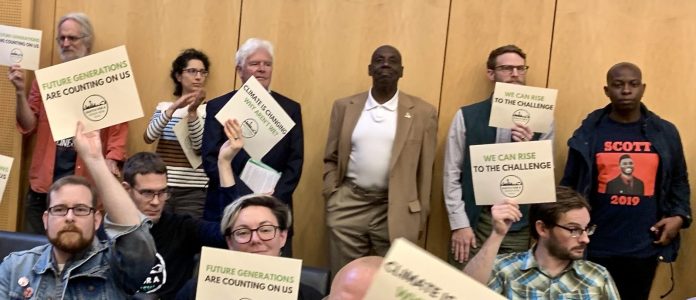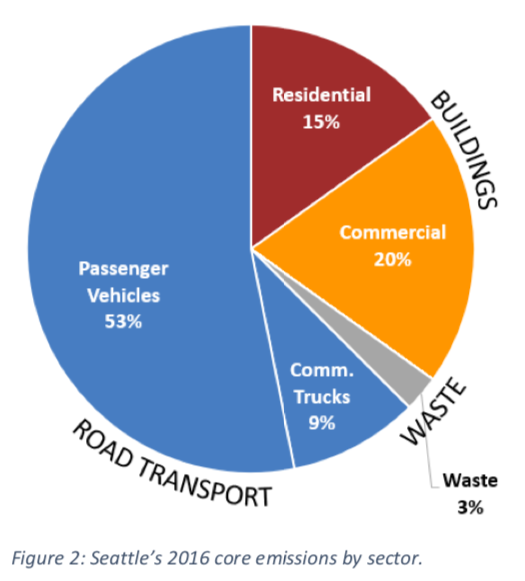
Seattle’s City Council has unanimously voted to endorse the Seattle Green New Deal, which calls for the City to create and implement policies and programs that will “eliminate [Seattle’s] climate pollution by 2030, address historical and current injustices, and create thousands of good, green, well-paying, unionized jobs”.
This sets Seattle on a path shared by New York City and Los Angeles, both of which signed localized Green New Deal policies into law earlier this year. However, it will take a while for Seattle to catch up.
“We are not talking policies yet,” said Alec Connon of 350 Seattle, which spearheaded the effort for a local Green New Deal campaign along with Got Green. “Our current goal is to open up political space.”
Earlier in June, the organizations submitted a letter to both Mayor Durkan and the City Council, asking them to commit to taking more action to address the climate crisis.
Although Mayor Durkan released a Climate Strategy in 2018, she has remained mute on the topic of a Green New Deal. To date, Mayor Durkan’s signature effort was to increase the number of electric car charging stations citywide, an approach that Stephen Fesler of The Urbanist pointed out is “by no means a panacea to the environmental woes of Seattle’s transportation system.”
The City Council, on the other hand, replied to 350 Seattle and Got Green with both an approval vote and endorsement letter that among other things underscored the need for continued public pressure, asking community leaders to hold elected officials accountable for creating the “boldest and most visionary policies possible to meet the unprecedented crisis of climate change.”
“We have to double down our work, and then do even more,” said Councilmember Mike O’Brien during a press conference before the council vote in which he was joined by local and national climate activists including LaDonna Brave Bull Allard, founder of Standing Rock Sioux Camp, which attracted international attention for its protests against the Dakota Access pipeline.

Referencing how her unborn daughter will be 31 years old in 2050, a date in which the global climate is predicted to be striking warmer if greenhouse gas emission do not decrease, Councilmember Teresa Mosqueda spoke with passion about the need to take action, imploring the crowd at City Hall to “rally around the urgency of now.”
Failure to meet climate goals
Both history and recent experience indicate that advocates for decreasing green house gas emissions will need to remain vigilant about demanding change. Last week the Trump Administration passed the Affordable Clean Energy (ACE) rule, a drastically weaker replacement for President Obama’s signature climate policy, the Clean Power Plan. According to Vox, “[t]he ACE rule is part of a concerted, and largely futile, strategy across the Trump administration to boost coal.” Some experts contend that the increased air pollution resulting from the ACE rule could lead to as many as 1,400 premature deaths annually by 2030. Thousands more people would also suffer from asthma and other upper respiratory infections, and of course, national progress toward achieving emission reductions would flatline.
As the Trump administration remains hostile to even acknowledging the climate crisis unfolding before us, states and cities are passing their own measures. Washington State’s 2019 Clean Energy Bill has some of the most ambitious carbon reduction targets out there, requiring that Washington power companies most eliminate coal power by 2025 and achieve 100% carbon neutral power sources.
While Seattle’s City Council adopted a Climate Action Plan in 2013, the City has continued to fail to meet its carbon emission reduction targets. The most recent report released by the Office of Sustainability and Environment found that Seattle’s carbon emissions increased by 0.6% between 2014 and 2016. Citing population growth, the City touted these numbers as a win; however, it’s clear that if Seattle wants to remain an environmental leader, the City will need to commit itself to more robust outcomes in emission reduction, particular in the area of vehicle and building emissions.

Seattle’s Green New Deal centers equity
One of the hallmarks of the Sunrise Movement’s Green New Deal was its centering of equity within its environmental policies and Seattle’s Green New Deal is no different. Environmental justice for low-income communities and the creation of living wage green economy jobs is a central part of the vision.
Additionally, when it comes to taking steps to create the actual policies that will constitute its Green New Deal, City Council has committed to “centering solutions from the communities most impacted by environmental issues–Black, Indigenous, People of Color and low-income communities.”
Alec Connon described how policies and programs could address pollution and contamination found in Duwamish River Valley communities like Georgetown and South Park that harm the health of residents, many of whom are lower income and people of color. These communities could be identified as “green zones” or areas that would receive high priority for investment.
Of course how exactly the Seattle Green New Deal will be financed is a question with massive equity implications. Activists have called for policies to be funded by progressive tax measures, a statement which has been echoed by the City Council as well, which has requested help in identifying progress revenue sources, a constant challenge in Washington State because of the statewide ban on taxing income.
Not surprisingly ideas for progressive revenue currently being floated include a progressive tax on big businesses, which is not being referred to as a head tax at this time. Other ideas include repurposing funds from the City’s general and/or rainy day funds, and placing a new tax on the use of natural gas for heating.
District 4 City Council candidate Shaun Scott, who has made addressing the climate crisis a cornerstone of his campaign, identified some additional possible revenue sources as well in an editorial for The Stranger. Scott’s ideas include a congestion tax, land value taxes, a tax real estate speculation, and increasing taxes on privately owned golf courses. Private golf courses are typically taxed at lower rates than residential properties, a situation vividly illustrated in Malcolm Gladwell’s Revisionist History podcast episode, “A Good Walk Spoiled,” which describes LA’s history of letting golf courses remain off the hook from paying taxes.

Are cities responsible for addressing the climate crisis?
In a nutshell, current practices around land use and zoning in the US mean that cities will need to remain at the forefront of addressing climate change, even if a climate friendly government comes into power at the national level. That’s because most land use decisions related to density, transit, and walkability are made at the city and county level.
In his article for Governing, writer Pete Sauders argued that increasing density and transit are the keys to reducing carbon emissions and creating a new green economy. Citing how the urban form in the US currently “prioritizes land consumption,” Saunders described how the resiliency should be cities’ goal moving forward in an era of climate crisis. “Density and transit are often presented as lifestyle options that cities can elect to choose. But with climate change, they may become integral features of effective adaptation,” Saunders wrote before going on to describe how cities could also lead the way in developing new technologies that address specific environmental issues such as drought.
While Seattle has made progress in increasing density and transit, it’s clear that a lot of work remains to be accomplished. Seattle Green New Deal Policies will be entering public discussion in upcoming months. Whether or not the City begins to implement policies that actually have teeth will determine if the Seattle Green New Deal is the beginning of significant climate justice policy on the part of the City or just another feel good resolution.
Natalie Bicknell Argerious (she/her) is a reporter and podcast host at The Urbanist. She previously served as managing editor. A passionate urban explorer since childhood, she loves learning how to make cities more inclusive, vibrant, and environmentally resilient. You can often find her wandering around Seattle's Central District and Capitol Hill with her dogs and cat. Email her at natalie [at] theurbanist [dot] org.


